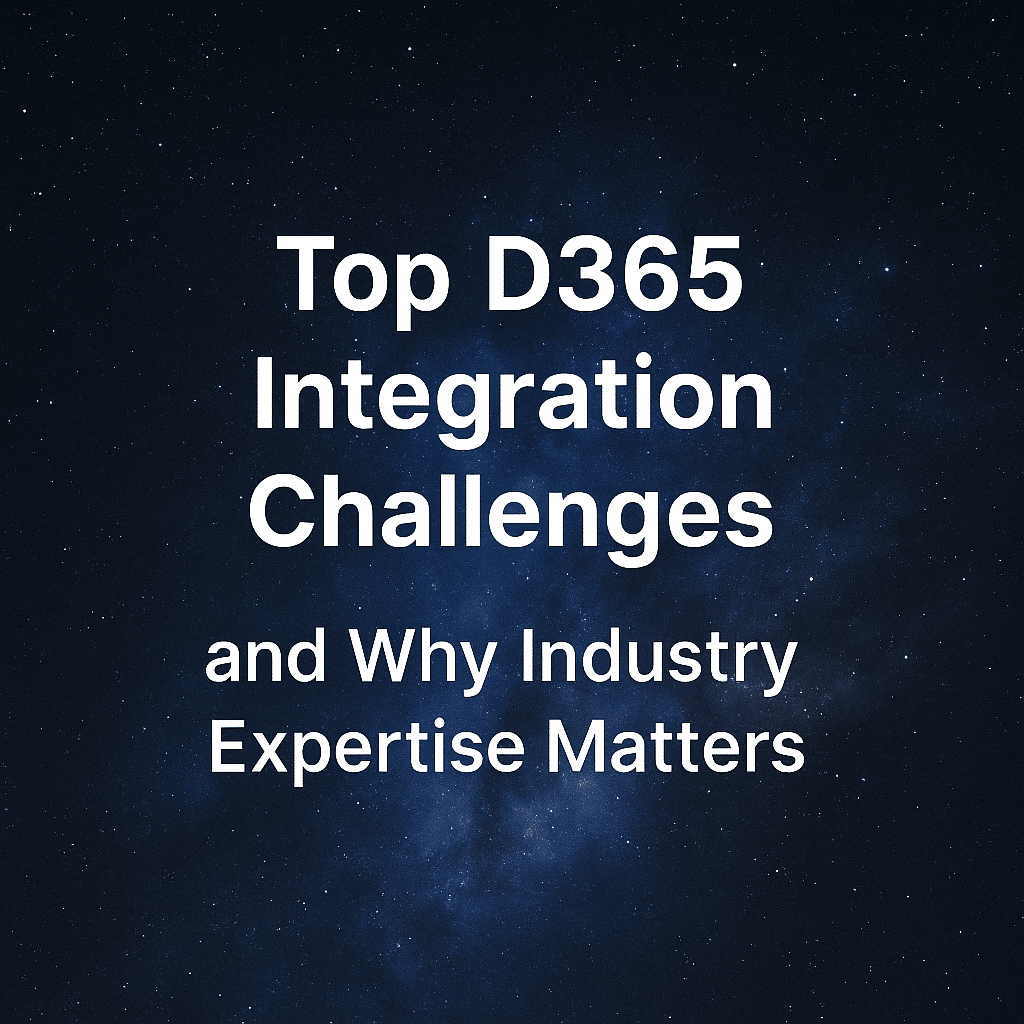Implementing Microsoft Dynamics 365 (D365) can unlock major benefits for businesses—but it often comes with significant integration challenges, especially when connecting non-Microsoft tools or outdated legacy systems. These issues can slow down deployments, introduce errors, or create long-term technical debt.
In this blog, we’ll break down the most common D365 integration challenges companies face and explain why choosing a system integrator (SI) with deep industry experience is more important than technical expertise alone.
Table of Contents
ToggleCommon D365 Integration Challenges in Complex Environments
1. MES and Shop Floor Automation in Manufacturing
One of the most common—and frustrating—D365 integration challenges occurs in manufacturing environments. Integrating D365 with Manufacturing Execution Systems (MES), robotics, and shop floor automation tools is rarely straightforward.
- Many of these tools were not built to connect with modern ERPs.
- Real-time data flows like production counts, machine status, and QA metrics may not sync properly.
- Middleware is often required, which increases costs and complexity.
Even though D365 has an open architecture, shop floor systems often rely on outdated protocols that require custom development to integrate properly.
2. Legacy Systems with No API Capabilities
Legacy systems—especially homegrown or outdated platforms—pose major roadblocks during D365 implementations. Many of these tools:
- Lack APIs or modern data connectors
- Use batch flat-file transfers instead of real-time syncing
- Were never designed with integration in mind
As a result, these systems often require significant rework or custom middleware to share data with D365, increasing the risk of errors and escalating implementation costs.
3. Industry-Specific or Regulatory Systems
In industries like healthcare, pharma, or aerospace, many organizations rely on highly specialized tools for compliance and regulatory tracking. Integrating these with D365 can be extremely difficult due to:
- Rigid data privacy or validation standards
- Compliance protocols (e.g., HIPAA, FDA, DoD)
- Uncommon file structures or access controls
These platforms often require extensive custom logic and security measures to ensure successful integration, which slows down the project and increases risk.
4. Non-Microsoft Productivity and Collaboration Tools
While D365 naturally integrates with tools like Teams, Power BI, and SharePoint, many organizations use platforms outside the Microsoft ecosystem. Integrations with:
- Google Workspace
- Tableau
- Slack
- Salesforce
…require custom connectors or third-party middleware, introducing new maintenance challenges and potential points of failure in the system architecture.
Why Industry Experience Trumps Technical Skill
Many companies assume the most important factor in selecting a system integrator is their technical knowledge of D365. But in reality, industry experience is often more important than technical skill when it comes to a successful implementation.
1. Avoiding Over-Customization
Integrators who don’t understand your industry often default to customizing D365 to replicate outdated processes—instead of improving them. This creates:
- Longer implementation timelines
- Increased technical debt
- More difficult upgrade paths
Experienced integrators understand how to use native D365 features to support your business model without reinventing the wheel.
2. Accelerating Deployment with Best Practices
Partners with deep industry knowledge can accelerate delivery by:
- Using proven configurations and workflows
- Avoiding unnecessary trial and error
- Addressing regulatory and compliance requirements proactively
This allows your business to go live faster—and gain ROI sooner.
3. Tapping into Industry-Specific ISVs
Microsoft’s partner ecosystem includes many ISVs (Independent Software Vendors) that build IP directly on the D365 platform. These solutions can drastically reduce customization requirements and help teams:
- Stay aligned with industry standards
- Leverage pre-configured modules
- Ensure long-term vendor support
Only integrators with industry experience know which ISVs are trustworthy and relevant.
4. Better Testing and Fewer Surprises at Go-Live
If your SI doesn’t know the common edge cases in your industry, they’re more likely to miss them during testing—leading to chaos during go-live. Industry-aligned partners:
- Understand unique workflows
- Anticipate compliance scenarios
- Ensure real-world test coverage
This reduces costly post-launch fixes and enhances user adoption.
Questions to Ask Your D365 Implementation Partner
Before selecting a system integrator for your D365 implementation, ask the following:
- Do you have experience in our industry?
- Can you share examples or case studies?
- Do you work with any ISVs specific to our sector?
- How do you approach integration with non-Microsoft systems?
- What’s your plan for testing compliance or edge case scenarios?
If the answers feel vague or overly focused on technical features, it may be a sign that your SI lacks the depth of understanding needed for your business environment.
Final Thoughts: Integration and Industry Expertise Go Hand-in-Hand
Microsoft Dynamics 365 is a flexible, powerful ERP—but only if it’s implemented correctly. Integration challenges are among the most common (and costly) hurdles organizations face. From MES to regulatory tools, these connections require thoughtful design and real expertise.
And while technical knowledge is important, industry experience is often the difference between a successful project and a failed one. Whether it’s avoiding customizations, leveraging ISVs, or simply understanding your unique business challenges, choosing a partner who knows your world makes all the difference.
Before you commit to a system integrator, make sure they bring more than just software knowledge. Look for partners who know your industry inside and out—and can help you integrate smarter, not just harder.
Need help navigating D365 integration challenges or selecting the right implementation partner?
At Third Stage Consulting, we provide independent, technology-agnostic guidance to help you evaluate D365 integrators, plan your ERP strategy, and overcome even the most complex D365 integration challenges. Our team brings deep industry experience to ensure your digital transformation succeeds—without vendor bias. Contact us today to learn how we can help.






